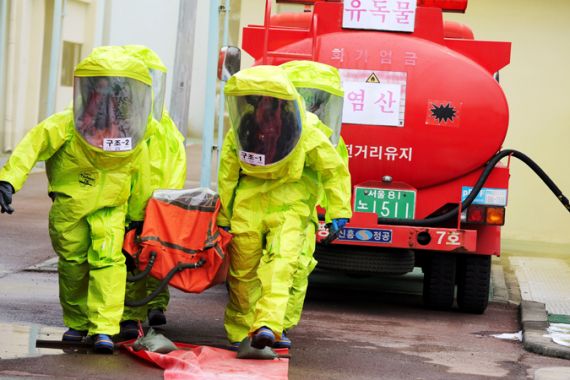US rejects N Korea’s nuclear status demand
North Korea says it will not negotiate with US or South Korea unless it is recognised as a nuclear state.

The US has rejected North Korea’s demands to be recognised as a nuclear state, keeping in line with Washington’s condition that the North has to agree to give up its nuclear arms programme before talks can begin.
After weeks of tension on the Korean peninsula, including North Korean threats of nuclear war, the North has in recent days begun to at least talk about dialogue in response to calls for talks from the US and South Korea.
Keep reading
list of 4 itemsWorld’s coral reefs face global bleaching crisis
Why is Germany maintaining economic ties with China?
Australia’s Great Barrier Reef suffers worst bleaching on record
On Tuesday, the North’s Rodong Sinmun newspaper carried commentary rejecting the US and South Korean condition that it agrees to dismantle its nuclear weapons and suspend missile launches as groundless and “totally unacceptable”.
“If the Democratic People’s Republic of Korea sits at a table with the US, it has to be a dialogue between nuclear weapons states, not one side forcing the other to dismantle nuclear weapons,” the newspaper said.
US rejection
Later on Tuesday, US Assistant Secretary for International Security and Nonproliferation Thomas Countryman rejected the North’s demands.
“North Korea’s demand to be recognised as a nuclear weapons state is neither realistic nor acceptable,” he said.
“It is important that the world respond calmly but deliberately without changing our emphasis that the goal of the world to which North Korea is committed is a denuclearised Korean peninsula.”
A White House spokesman said earlier this month that North Korea would need to show it was serious about abandoning its nuclear ambitions for talks to be meaningful.
North Korea signed a denuclearisation-for-aid deal in 2005 but later backed out of that pact. It now says its nuclear arms
are a “treasured sword” that it will never give up.
It conducted its third nuclear test in February.
That triggered new UN sanctions which in turn led to a dramatic intensification of North Korea’s threats of nuclear strikes against South Korea and the US.
Radioactive gases
Also on Tuesday, a UN agency tasked with looking for signs of nuclear explosions says its monitoring stations have detected radioactive gases that could be linked to the February test.
CTBTO says stations in Japan and Russia have picked up “significant” traces of noble gases that accompany a nuclear explosion and say they “could be attributed” to the North’s test.
A statement from the Vienna-based CTBTO said the Japanese station is located around 1,000 km from the test site.
“Using Atmospheric Transport Modelling, which calculates the three-dimensional travel path of airborne radioactivity on the basis of weather data, the DPRK test site was identified as a possible source for the emission,” said the agency.
It says lower levels were picked up by the Russian site at Ussuriysk, without giving its location in relation to the site.
It says the two types of xenon radioactive isotopes detected “provide reliable information on the nuclear nature of the source.”